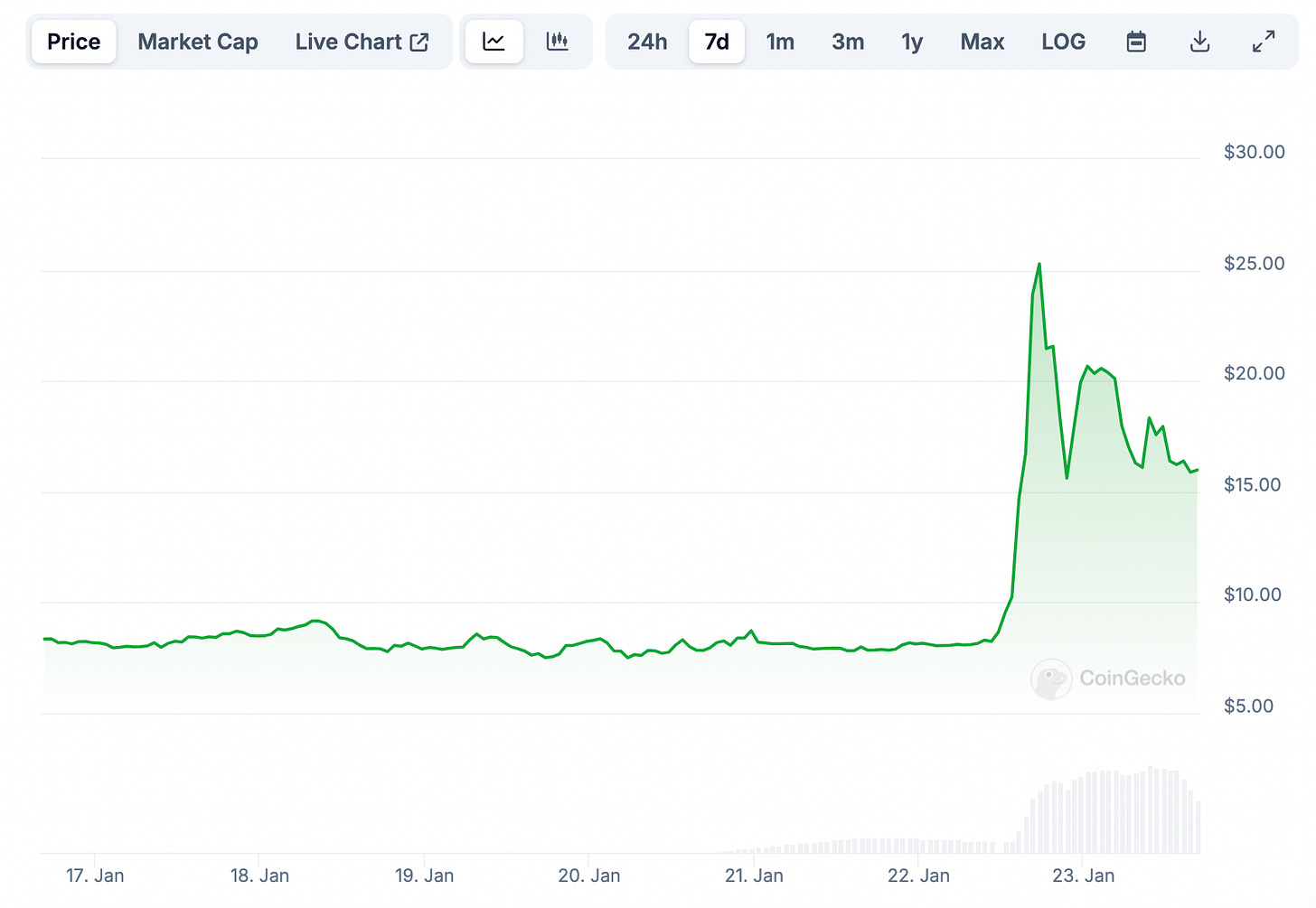When Code Can't Be Controlled 🆓
Hello dispatchers!
Today we're diving into one of the most significant court rulings in crypto history.
A Texas court decided you can't sanction code.
Yes, they freed Tornado Cash - they potentially rewrote the rules of crypto regulation.
This edition takes you inside
How a privacy protocol beat the US Treasury
Why Vitalik is backing developers with his ETH
What happens when code becomes truly autonomous
And why this ruling could reshape crypto's future
Upgrade to paid to get full access to our weekly premium features (Wormhole, Rabbit hole and Mempool) and subscribers only posts. 2025 New Year special limited time offer - 38% off on our annual subscription.
How do you sanction something that can't be controlled?
That's the question at the heart of a groundbreaking court ruling that just overturned US sanctions against Tornado Cash, the controversial crypto mixing service.
The verdict doesn't just affect one protocol — it challenges the very foundation of how governments regulate decentralised technology.
Block That Quote🎙️
US Appeals Court
"Mending a statute's blind spots or smoothing its disruptive effects falls outside our lane."
To understand why this ruling matters, we need to first understand what made Tornado Cash both revolutionary and controversial.
Unlike traditional financial privacy tools, Tornado Cash isn't a company or service. It's a piece of autonomous code living on the Ethereum blockchain that lets users break the connection between their sending and receiving addresses.
The protocol works through a series of "pools" where users deposit specific amounts of cryptocurrency.
When you deposit 1 ETH, for example, it goes into a pool with other 1 ETH deposits.
You receive a cryptographic note — essentially a secret password.
Later, you can use this note to withdraw the same amount of ETH to a different address. Because the withdrawn ETH could have come from any deposit in the pool, the link between source and destination is broken.
This is privacy engineering at its finest. But it's also what caught the attention of regulators.
The Sanctions Saga
In August 2022, the Treasury's Office of Foreign Assets Control (OFAC) made an unprecedented move: they added Tornado Cash to their sanctions list. The justification? North Korea's notorious Lazarus Group had allegedly laundered over $455 million through the protocol.
OFAC's decision sent shockwaves through the crypto industry. Not because mixing services had never been sanctioned before — they had been.
But because this was the first time the government had tried to sanction autonomous code.
The consequences were immediate and far-reaching. Tornado Cash developer Alexey Pertsev was arrested in the Netherlands.
The protocol's website went dark.
Major platforms started blocking addresses that had interacted with Tornado Cash. Even legitimate users found their funds frozen.
Read: Why Tornado Cash Matters? 🌪️
The Immutability Defense
In 2020, two years before the sanctions, Tornado Cash's developers had done something radical — they permanently relinquished control over their smart contracts, making them truly immutable.
This wasn't just a technical detail. It was the core of what would become the legal defense.
The developers had effectively turned Tornado Cash into something that couldn't be modified, removed, or controlled.
Not by them, not by the US government, not even by North Korean hackers.
This immutability became the cornerstone of the court challenge.
Six users of Tornado Cash filed an appeal arguing that OFAC had overstepped its "statutory authority."
Their argument was elegantly simple: how can you sanction something that, by design, can't be owned or controlled?
The US District Court for the Western District of Texas agreed. In a landmark ruling, they determined that "Tornado Cash's immutable smart contracts are not the 'property' of a foreign national or entity." You can't sanction code that nobody owns.
Read: Code No Criminal 🌪️
More Than Just Money
The stakes here weren't just about one protocol or even about money laundering.
The case raised fundamental questions about the nature of decentralised software and the limits of government power in the digital age.
Can code be property? Can autonomous software be sanctioned? Where does regulatory authority end and technological autonomy begin?
These are philosophical ones that get to the heart of what makes blockchain technology revolutionary.
The Tornado Cash case forced the courts to grapple with these questions head-on.
Buy Once, Earn Daily Bitcoin Forever
Infinity Hash brings the best aspects of cloud and colocation mining into a transparent and reliable system that provides long-term cash flow.
The Industry Rallies
When the government targeted Tornado Cash developers, something remarkable happened — the crypto industry united.
Leading figures like Ethereum co-founder Vitalik Buterin stepped forward, donating 50 ETH (approximately $170,000) to support the legal defense of developers Roman Storm and Alexey Pertsev.
This wasn't Buterin's first show of support either. In October, he had already contributed 100 ETH to the Free Pertsev and Storm Juicebox, signalling that the industry's heavyweights saw this as more than just another regulatory battle.
The case has triggered multiple legal battles:
Coin Center filed a lawsuit against the Treasury Department
Coinbase backed a group of Tornado Cash users in legal action
The broader crypto lobby pursued litigation against former Federal Reserve Chair Janet Yellen
These concurrent legal challenges reflect the industry's determination to establish clear boundaries between code and crime.
Coinbase CLO Paul Grewal and the entire crypto industry has shown support and is celebrating the news.
And they are thanking Trump for the win.
The Blockchain Association captured the ruling's essence:
"Technology is a tool that can be used, or misused, by anyone. Our government should penalise the bad actors that abuse these tools rather than the tools themselves."
This principle resonated across the industry. The ruling effectively established that neutral technology shouldn't be punished for its potential misuse — a precedent that could protect future innovation.
The Human Cost
Behind the legal arguments and code debates, there's a human story. Alexey Pertsev spent over a year in Dutch custody before being sentenced to five years and four months in prison. Roman Storm faces his trial in April, while his colleague Roman Semenov remains at large.
The severity of these prosecutions sparked outrage across the crypto community.
After all, if developers can be jailed for writing privacy-preserving code, what does that mean for innovation?
When the Texas court announced its decision, TORN, Tornado Cash's governance token, surged 140%. Trading volume exploded as investors bet on privacy tech's future.
But the implications run deeper than price movements.
The reversal of Tornado Cash sanctions was a victory for privacy advocates and also a significant setback for Brian Nelson, the Treasury's former undersecretary for terrorism and financial intelligence, who had led the initial charge against crypto mixing services.
Under Nelson's leadership, the Treasury had positioned itself as crypto's primary antagonist, viewing privacy tools like Tornado Cash not as neutral technology but as enablers of terrorism and criminal cartels. His department went beyond simple sanctions, pushing to label mixing services as a "primary money laundering concern."
Token Dispatch View 🔍
The court's ruling creates a fascinating precedent. By determining that immutable smart contracts can't be sanctioned as "property," it effectively creates a new category of digital asset — one that exists beyond traditional regulatory frameworks.
This poses challenging questions for regulators:
How do you regulate code that can't be controlled?
What's the line between privacy and money laundering?
Can developers be held responsible for how others use their code?
A New Framework Needed
The verdict suggests that existing regulatory tools, designed for a world of controllable assets and identifiable actors, may be fundamentally unsuited for decentralised systems.
Some lawyers are already suggesting that new frameworks may be needed — ones that recognise the unique properties of immutable smart contracts while still addressing legitimate concerns about illicit finance.
While the ruling is a victory for privacy advocates and developers, it's unlikely to be the final word. The Treasury Department could appeal, and other jurisdictions might take different approaches.
What's clear is that the Tornado Cash case has forced a crucial conversation about the intersection of:
Privacy rights
National security
Technological autonomy
Developer liability
This ruling doesn't just affect Tornado Cash. It sets the stage for how we'll treat all autonomous software in the future.
Token Dispatch is a daily crypto newsletter handpicked and crafted with love by human bots. You can find all about us here 🙌
If you want to reach out to 200,000+ subscriber community of the Token Dispatch, you can explore the partnership opportunities with us.
Disclaimer: This newsletter contains sponsored content and affiliate links. All sponsored content is clearly marked. Opinions expressed by sponsors or in sponsored content are their own and do not necessarily reflect the views of this newsletter or its authors. We may receive compensation from featured products/services. Content is for informational purposes only, not financial advice. Trading crypto involves substantial risk - your capital is at risk. Do your own research.














